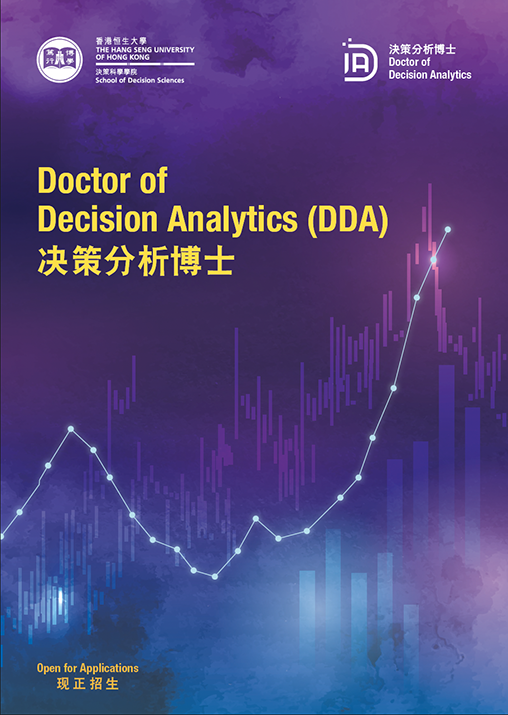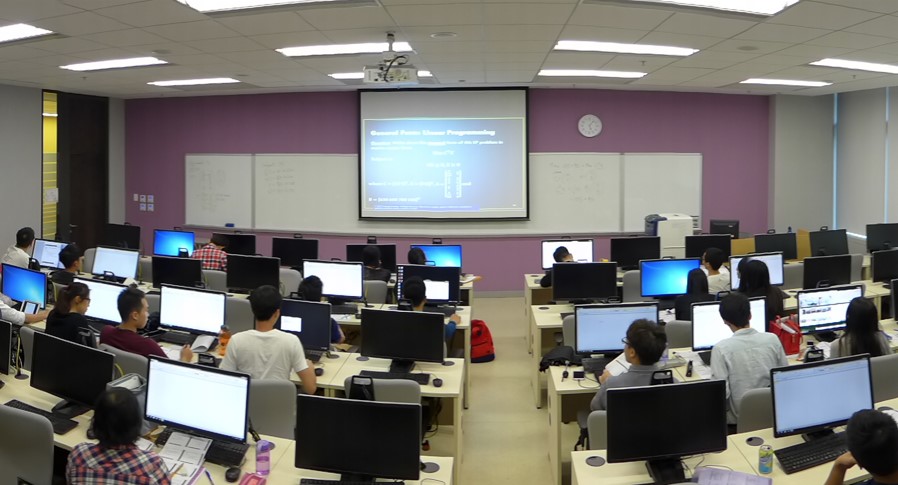

The Doctor of Decision Analytics (DDA) is the first professional doctorate programme in Hong Kong focused on decision analytics. It teaches students how to make complex business decisions using statistics and computer science, and how technology creates a global supply network. The programme provides advanced knowledge in statistics, computer science, and supply chain management, helping students make informed decisions in business and public sectors. It also integrates academic study with practical experience to support career development in business.
Programme Objectives (POs)
The Programme Objectives (POs) are to:
- Equip students with advanced decision analytics knowledge and enhance students’ communication and leadership skills for making appropriate decisions in business and public sectors.
- Raise students’ awareness of ethical and professional issues in the decision analytics discipline.
- Cultivate students’ ability to deal with complex/new issues and make informed judgement in situations in the absence of complete or consistent data/information.
- Develop students’ ability to carry out independent research and enhance their ability to deliver ideas, research methodology and findings.
Programme Intended Learning Outcomes (PILOs)
Upon completion of the Programme, students should be able to:
- Apply a broad spectrum of advanced knowledge and skills for professional practice in decision analytics and produce creative and original responses to problems/issues in the context of new circumstances.
- Deal with complex ethical and professional issues.
- Deal with complex/new issues, evaluate strategies and situations critically, and form informed judgement while working with incomplete or inconsistent data/information.
- Demonstrate effective research skills including formulation of a research problem, design of a research study, data analysis, summarizing and presenting the results.
Key Features

Equip students with advanced decision analytics knowledge and enhance student’s communication and leadership skills

Prepare students as competent and ethical professionals in decision analytics

Cultivate students’ ability to deal with complex/new issues and make informed judgement in situations in the absence of complete or consistent data/information

Develop students’ ability to carry out independent research and enhance their ability to deliver ideas, research methodology and findings
Medium of Instruction
English
Teaching Venues



Programme Curriculum
The DDA programme consists of three major parts:
- four taught core modules;
- at least four taught elective modules;
- two professional and research modules.
Core Modules
Four taught core modules
SDSC6001 Quantitative Methods for Data Science
This module introduces the use of applied statistical methodologies as a comprehensive approach in data science. It provides students with the knowledge to further apprehend in-depth material presented in other modules of the programme. Topics include exploratory data analysis, data visualizations, probability, discrete/continuous probability distributions, point and confidence interval estimation, hypothesis testing and regression analysis.
SDSC6002 Programming for Decision Analytics
This module is to show students the programming techniques about how to work with big data, getting data from a variety of sources and visualising data in compelling and informative ways. Students will learn the characteristics, eco-systems, frameworks, and ethical issues with big data and how to program with the data with emphasis on data source connection, data pre-processing pipeline, exploratory data analysis, data visualizations and data reporting. Students will have hands-on programming experience in data preparation, exploration, analysis, and visualization.
SDSC7001 Research Methods for Decision Analytics 1
This module introduces students to the fundamental concepts and techniques of decision analytics research methods, with a focus on quantitative research. It employs a step-by-step, hands-on approach to help students understand, apply, and interpret data in decision-making scenarios. Through practical examples, group discussions, and interactive exercises, students will learn how to formulate research questions, collect and analyze data, apply statistical techniques, and effectively present their findings. Additionally, the module addresses the ethical considerations associated with quantitative research.
SDSC7002 Research Methods for Decision Analytics 2
Qualitative research is a valuable method that allows researchers to explore complex phenomena in depth, understand individuals’ subjective experiences, and uncover the meanings behind social and cultural practices. This module introduces students to the fundamentals of qualitative research in a straightforward and practical manner. It offers a step-by-step guide to understanding, collecting, and analyzing qualitative data while also addressing the ethical considerations inherent in qualitative research.
Professional and Research Modules
SDSC7003 DDA Residential
This module comprises a series of professional and research activities, including professional talk series, research seminars/workshops, as well as research/company visits. These activities are organized around specific themes to provide students with advanced knowledge in decision analytics and to enhance their professional/research skills. Additionally, the module includes student presentations and study tours/field trips. Students are required to present their research findings, including the progress of their thesis and the results of their study tour, to their peers and professors in a professional manner. This setting not only facilitates the sharing of ideas for practical insights but also allows students to connect with a diverse group of talented individuals. This is a one-year module and operates under a Pass/Fail grading system.
SDSC7004 DDA Thesis
This module is designed primarily as an independent study, where students can implement an approved research project under the supervision of a Module Coordinator (Professorial staff of School of Decision Sciences). Students are required to integrate the knowledge and skills they have acquired in the area of decision analytics to produce a doctoral thesis. The originality of the thesis shall be shown by (i) the discovery of new facts or theories; or (ii) the demonstration of innovative and/or critical thinking; or (iii) identifying a real-world problem within the field and research it thoroughly with the intent of uncovering new understandings that can eventually lead to new solutions. In addition, students are required to present and defend their research outputs to the Thesis Examination Committee in a professional manner. Students should refer to the Thesis Guidelines when they prepare the thesis and oral examination.
This module is under the Pass/Fail grading system. The Thesis Examination Committee will assess the quality of the thesis and oral examination to determine whether a student successfully passes this module.
Elective Modules
At least 4 Taught Elective Modules (select at least one module from at least two clusters)
Data Analytics Cluster
AMS6104 Data Analytics
This module aims to provide students with the data analytics techniques for solving practical problems in risk management. Students will learn a set of statistical tools for data visualization and apply data analytics techniques such as classification, association rules, cluster analysis and dimensionality reduction to analyse practical problems. Ethical issues related to the use of data will also be discussed. Students are required to work effectively in a team to complete a project.
AMS6107 Analysis of Financial Time Series
This module deals with the methodology and applications of business and financial time series. Topics include statistical tools useful in analyzing time series, models for stationary and non-stationary time series, seasonality, forecasting techniques, heteroskedasticity, ARCH and GARCH models, and multivariate time series.
AMS6108 Simulation for Risk Management
This comprehensive module offers a deep dive into the field of simulation and its utilization in the realm of risk management. The course begins with an overview of the definition and historical background of simulation and highlights its significance in managing risk effectively. Through this course, learners will gain an understanding of the generation of random variables, including pseudorandom numbers, discrete and continuous random variables, and random vectors. The statistical analysis of simulated data will be explored in detail, including important concepts such as sample mean and variance, the construction of confidence intervals, and the application of bootstrapping techniques. To further enhance the accuracy of simulated data, the course delves into variance reduction techniques such as control variates, antithetic variates, variance reduction by conditioning, and stratified sampling. Lastly, the course concludes by examining other applications of simulation in risk management, including the evaluation of exotic options and the development of insurance risk models.
AMS6109 Advanced Data Analytics
This module introduces various advanced methods for linear and non-linear models in data analytics, and discusses the mathematical principles behind them as well as their trendy real-life applications. Major topics include Principal Component Analysis, polynomial regression, spectral regression, kernel regression, logistic regression, Bayesian classifiers, Classification and Regression Trees, EM algorithm, MM algorithm. The implementation of the tools in statistical software will also be demonstrated.
COM6002 Big Data Management
This module covers data management theories and systems. In addition to traditional data management concepts using relational databases, Big Data features extremely large volume of unstructured data that traditional databases are not able to handle. The emphasis of the module is on computing techniques to cater Big Data, including distributed storage, database-as-a-service paradigm and NoSQL. Students are also trained with hands-on skills with state-of-the-art systems, e.g., MongoDB.
COM6103 Big Data Security and Privacy
The module examines the emerging trends and issues in security and privacy of big data applications, such as web and mobile services. Big data analysis could be beneficial to businesses and the society, but in general it involves collection of sensitive or even confidential personal data, which could result in devastating consequences to the person, businesses, and the society if the data are mishandled. Hence, the module focuses on identifying selected aspects of security and privacy issues and challenges in such big data applications. It explores existing approaches and available tools to enforce security and preserve privacy, and equips students with the ability to evaluate the security and privacy of a solution to a security and/or privacy issue.
SDSC6003 Machine Learning
This module provides students with the machine learning methodologies and algorithms for solving real-life problems. Topics selected include supervised learning, unsupervised learning, ensemble learning, kernel methods, module evaluation and advanced topics in machine learning. Students are also required to work effectively in a team to complete a project.
SDSC6004 Deep Learning
This module aims to provide students with both theorical knowledge and practical skills on deep learning to develop modern neural networks for various applications. Theories and concepts such as optimization, back-propagation, regularization, model training and validation, overfitting, deep neural networks etc., will be introduced. The module will also equip the students with skills to use deep neural networks for solving day-to-day decision problems.
SDSC7005 Selected Topics in Data Science
This module aims to expose students to current trends in cutting-edge research areas in data science (DS). It emphasizes broadening the students’ knowledge by teaching them new methodologies used in modern DS research. Practical examples are used for illustration. Students can learn computational and numerical skills and techniques for data analysis. The topics vary according to the expertise and interests of module coordinator.
Supply Chain Analytics Cluster
SCM6001 Contemporary Operations Management
This module aims at introducing the knowledge, skills and techniques related to operations management. Specifically, the module addresses certain contemporary issues in operations management to provide students with the state-of-art view of the operations function to business success.
SCM6002 Global Supply Chain Management
The aim of this module is to equip students with an understanding and foundational knowledge of the analytical frameworks, methods and tools for developing, implementing, and evaluating effective strategies and tactics for managing key supply chain operations and logistics activities (including purchasing, warehousing, and transportation) in the global context.
SCM6003 Transport Logistics and Law
This course integrates comprehensive freight transport logistics management and the legal knowledge in shipment delivery. This course focuses on teaching the technical, operational and regulatory aspects of cargo carriage, and equips students with managerial skills in making strategic decisions on pricing, costing and operations in freight management. Latest trends, policies and technologies that affect various aspects of transport logistics and major stakeholders will also be discussed in the course.
SCM6004 Strategic Procurement Management
Strategic Procurement Management (SPM) is a cornerstone for businesses to pursue competitiveness and prosperity in the dynamic market environment. It serves as a business strategy directing the competitiveness of organisations and the performance of associated supply chain. To this end, employees who possess full-borne knowledgeable of performing and managing various SPM activities such as supply sourcing and outsourcing, supply chain integration, supply chain costing, and contractual management and control, become the valuable and non-substitutable assets to the businesses.
This module aims at providing students with advanced concept and techniques of SPM. They will learn state-of-art knowledge and skills of SPM and prepare themselves for becoming the procurement professionals and playing a key role in organisations who is responsible for making strategic procurement decisions based upon a holistic view of operations and supply chain management perspective.
SCM6005 Decision Modelling for Managers
This course teaches a range of quantitative methods for making practical decisions with emphasis on supply chain management issues. The methods covered include linear programming, network models, nonlinear programming, machine learning techniques, and simulation modelling and evaluation. At the end of the course, the students are required to create a constraint-driven or data-driven decision support system for a selected SCM topic.
SCM6007 Process Management in Supply Chain
This module aims at providing students the advanced concepts and techniques in control, improving and design business process in supply chain.
SCM6010 Project Management
This course provides a comprehensive introduction to project management. A major focus is on how to manage various projects to successful completion within the constraints of resources and time, with an emphasis on supply chain related projects. Included in the contents are the frameworks for proposal writing and planning, monitoring and controlling, risk management, performance evaluation, and PM software. The course covers many topics from the Project Management Body of Knowledge (PMBOK) thus facilitating student preparation for CAPM/PMP exams. In addition to traditional project management methodology, the course also discusses Agile PM techniques, used for managing highly uncertain projects in the IT and SCM domains.
SCM6011 Supply Chain Analytics
The tremendous amount of information available paves the way for the use of analytics to obtain vital information for the planning and control of supply chains. Recent advances in information technologies and data science have contributed to the rapid increase of data-driven decision making. To address this trend, this module focuses on the application of advanced analytics as well as on business intelligence to supply chain management. Students are expected to leverage analytical techniques, tools and new sources of data for better supplier intelligence and supply chain problem solving. The primary goal of the module is to familiarize the students with tactical and strategic issues surrounding the design and operation of supply chains, to develop supply chain analytical skills for solving real life problems, and to teach students a wide range of methods and tools in the areas of predictive, descriptive and prescriptive analytics to efficiently manage demand and supply networks.
SCM6013 E-Business and Enterprise Systems
This module focuses on how information technology, in particular enterprise systems impact the adopting organisations and achieve e-business innovation in the continuously evolving internet driven business world. In a strategic sense, essential enterprise systems are required to increase the effectiveness and efficiency of a company’s complex business processes and those that enhance a business’ online presence. In order to fully utilise IT and maximise the benefit it brings, the module would analyse various types of enterprise systems, technologies and architectures, and their impacts on organisations internally in consideration of the business function areas, as well as on the external environment. Roles and functions of enterprise systems in an e-business and supply-chain environment will be addressed along with different e-commerce business models. Students would also be able to have hands-on experience with an enterprise system package (e.g. SAP) that integrates and manages data across the enterprise to successfully execute business operations, and more importantly link their operations seamlessly with customers and suppliers. Through workshops and group discussions, students will configure enterprise system modules (e.g. MM, SCM, CRM, HRM and procurement) for various business scenarios and examine the business reporting processes to support strategic decision making.
SCM6014 E-Logistics and Technology Management
In the dynamic global operations with the development of information and communication technology, the importance of managing the digital supply chain and the information flows are well recognised. However, not many organisations are able to take the full advantages of fast-paced technological developments due to the system integration issues. E-logistics system solutions therefore serve as the integrated intelligent approach to enable smooth information flow within and between organisations in the whole supply chain.
This module aims to provide students with integrated knowledge to manage various information technologies for the e-logistics management. The organisation of this module is divided into two parts. First, the applications of emergent information technologies, such as mobile apps, cloud database, Radio-frequency identification (RFID), and their benefits would be reviewed and evaluated. Second, the design and the development of information technology solutions as well as the relevant theories and techniques would be covered.
SDSC7006 Selected Topics in Supply Chain Management
This module aims to expose students to current trends in cutting-edge research areas in supply chain management (SCM). It emphasizes broadening the students’ knowledge by teaching them new methodologies used in modern SCM research. Practical examples are used for illustration. The topics vary according to the expertise and interests of module coordinator.
Business Analytics Cluster
ACY6121 Accounting for Decision Making
This module aims to provide students with a broad coverage of topics in management and cost accounting. It focuses on how to apply costing concepts and techniques in business decisions. Both quantitative and qualitative methods are covered in this module. This module also emphasizes the links between accounting information and management activities such as strategic and operational decision making, financial planning and control, organization design, and performance evaluation. It enables students to develop critical thinking, analytical skills and ethical awareness to aid decision making in the management accounting context.
FIN6107 Fintech and Innovation
The module examines current and emerging technologies around money and payments, markets and consumer experience, and explores key ideas, principles and frameworks around finance, regulation, banking, insurance and social inclusion. It aims at providing students with the insights and knowledge necessary to navigate this challenging landscape, and equipping students with the knowledge to participate in this emergent field, as well as provide resources and support on how to shape their own fintech innovation and ventures.
FIN6110 Contemporary Issues in Financial Markets
This module aims at developing students’ insights about the latest developments in the economy and the financial markets, as well as equipping students to acquire and strengthen their discovery skills for analyzing the current issues relating to global finance. The main theme is designed to allow for a wide range of topics, covering the diverse nature of both academic and professional enquiries in financial markets, especially, the challenges over the changes in China’s economy and its impacts to the world’s market are explored and various strategies to reform China’s financial market are analyzed. Through inviting well-respected financial industry leaders and business professionals to share their expertise on the current state of the markets and the role financial institutions can play in shaping the future, students can acquire knowledge about the policy decisions and practices that affect financial stability.
MGT6116 Global Management
This module focuses on identifying the challenges and opportunities associated with organizational management in the global environment. Through this module, students can gain a general overview of the process and effect of globalization in contemporary business environments. The course content includes an introduction to theories and concepts in international management and training in critical analysis of organizational problems. Students are expected to engage in active research, apply knowledge and solve organizational problems common for global managers and systematically present their findings and solutions to the class.
MKT6004 Digital and Cyber Marketing
This module is designed to facilitate students’ exploration of how emerging digital technologies impact traditional marketing practices. It features in-depth analysis of the Internet user characteristics and consumer behaviour in the networked-economy. It also focuses on the knowledge and skills pertinent to marketing strategies and tactics in the digital marketing environment.
MKT6103 Global Strategic Marketing
This module highlights the global nature of contemporary strategic marketing. It aims to understand how marketing strategies and tactics interact with the economic, trade, social-cultural and political-legal-regulatory factors in the dynamic global marketplace; to address the managerial challenges in formulating, implementing and evaluating multinational marketing strategies; to develop critical thinking and analytical skills necessary for complex decision making; and to enhance interpersonal and communication skills through teamwork and other experiential learning activities.
SBUS6002 Managing Innovation in Information Technology
This module equips students with the advanced knowledge and skills to manage innovation in information technology. It addresses the important role of emerging and disruptive technologies to the success of entrepreneurial firms. It promotes a critical mindset of students to assess and evaluate the readiness and capability of firms to adopt innovation in the entrepreneurial context.
Students are able to learn applications of innovation in information technology to deliver value to the firm and the market from a strategic perspective.
Credit Transfer / Module Exemption Policy
Credit Transfer / Module Exemption
- Credit transfer/ module exemption may be granted for modules at the same level completed successfully at the University or in another accredited tertiary institutions.
- The qualification/award in relation to the credits to be transferred or modules to be exempted should normally be earned not more than eight years before admission to the University.
- The maximum number of credits to be transferred or modules to be exempted at the point of joining the University is specified by the programme and shall not exceed 50% of the curriculum requirement of the admitted programme at HSUHK, i.e. professional doctorate students are required to complete at least 50% of the curriculum requirement of the admitted programme at HSUHK. Credit transfer/module exemption to residential module and professional doctorate thesis of the admitted programme is not allowed.
- The credits transferred will be counted towards the graduation requirements but will be excluded from the calculation of the student’s cumulative GPA (cGPA).
- Each exempted module should be replaced by a module of the same credit value. The exempted module will be excluded from the calculation of the student’s cGPA.
- Credit transfer/module exemption will normally be processed once before the commencement of the first semester following admission to the programme. Application with supporting documents should be submitted to the Graduate School two weeks before the commencement of the first semester after admission to the programme.
- Credit transfer/module exemption will be reviewed and approved by the Programme Director.
Mode of Study
Three years (Full time)
Six years (Part time)
Graduation Requirements
To be eligible for the award of the DDA Programme, students are required to:
- Complete and obtain a Grade D or above in at least 24 credits of taught modules, including 12 credits from all taught core modules;
- Receive a “Pass grade” for the residential module (6 credits) and the DDA thesis (30 credits); and
- Obtain a minimum cumulative GPA of 3.0.
Intermediate Exit Award
Students who leave completing part of, but not all the requirements of the DDA programme may apply for the Intermediate Exit Award of Master of Science in Decision Analytics (MSc-DA).
To be eligible for the award of the MSc-DA Programme, students are required to:
- Complete and obtain a Grade D or above in at least 24 credits of taught modules, including 12 credits from all taught core modules; and
- Obtain a minimum cumulative GPA of 2.0.
Programme Team

Wai Sum CHAN, Professor
PhD (Temple)
Actuarial Modeling, Business Forecasting, Financial Economics

Siu Kai CHOY, Professor,
Programme Director
PhD (HKBU)
Data Mining, Machine Learning, Image Processing

Derrick FUNG, Associate Professor
PhD (CUHK)
Insurance Regulation, Management, Corporate Finance for Insurers

George HO, Associate Professor
Associate Programme Director
PhD (HKPolyU)
Internet-of-Things Applications and Business Intelligence

Benson LAM, Associate Professor
PhD (HKCityU)
Data Mining, Machine Learning, Image Processing, Pattern Recognition

Hai LIU, Professor
PhD (HKCityU)
Robotics Networks, Cloud Computing, Swarm Intelligence

Chris MA, Associate Professor
PhD (Purdue)
Security and Privacy of Cyber Physical Systems

Helen MA, Associate Professor
PhD (HKPolyU)
Big Data and Machine Learning in Transportation Network Analysis

Daniel MO, Professor
PhD (HKUST)
Logistics Systems Optimization, Design of Intelligence Systems

Stephen NG, Associate Professor
PhD (CUHK)
Supply-chain Quality and Risk Management

Tom NG, Associate Professor
PhD (CUHK)
Change-point Analysis, Bootstrap Resampling, Time Series

Chi Chung SIU, Associate Professor
PhD (TMU)
Stochastic Control, Actuarial Mathematics, Financial Mathematics, Operations Research, Stochastic Differential Games

Eugene WONG, Associate Professor
PhD (HKU)
Maritime and Aviation Logistics, Supply Chain Decarbonization, Shipping Law

Jack WU, Associate Professor
PhD (HKPolyU)
Industrial Internet-of-Things, Smart Logistics and Manufacturing

Carisa YU, Associate Professor
PhD (HKPolyU)
Asset Management, Risk Management, Financial Optimization, Option Pricing
Admission Details
Online Application🔥📢
Applications should be submitted online through Postgraduate Admission System. Applicants are reminded to read the Notes for Applicants before submitting the application.
Admission Requirements
- A bachelor’s degree with second class honours (upper division) or equivalent in science, engineering, business or related disciplines from a recognised university or institution; or
A master’s degree or equivalent in science, engineering, business or related disciplines from a recognised university or institution; - A minimum of three years’ relevant work experience; and
- Fulfilment of one of the following English language proficiency requirements is required if none of the applicant’s previous degrees (bachelor’s or master’s) was obtained from a university/tertiary institution where English is the medium of instruction:
- TOEFL≥550 (paper-based), ≥79 (Internet-based),
- IELTS (Academic) ≥ 6.0,
- CET 6 ≥ 430 or “Pass” if the test was taken before June 2005;
- or an equivalent qualification.
Tuition Fee (2026/2027)
HK$600,000 (Total 60 credits)
Remarks:
1. Alumni of HSSC/HSMC/HSUHK would receive a tuition fee reduction equivalent to 10% of the programme’s tuition fee.
2. Full-time staff of HSUHK would receive a tuition fee reduction equivalent to 30% of the programme’s tuition fee.
Application Deadline
Non-local Application Deadline:
30 June 2026
Local Application Deadline:
22 August 2026
Remark:
Applications will be processed on a rolling basis until all places have been filled. Early submission is highly encouraged.
Enquiries
- Email: dda@hsu.edu.hk
- Phone: +852 3963 5594
- WeChat:

- WhatsApp:

- rednote:

Programme Facilities
Laboratory Facilities



Research Performance
Strategic Research Area
- Artificial Intelligence and Networking with Cloud
- Business Analytics and Supply Chain Excellence
- Data Mining and Quantitative Risk Management
Research Grants (up to 2024/25)
- Over HK$160 million
Message from Industry Leaders
Decision analytics is a discipline which ensures that business decisions are made by considering all the relevant factors, information, and options available. Therefore, our company has always treated *Decision analysis* as a very crucial role in all business areas such as risk, capital investments, strategy, asset investment planning, and more.
(Business Director, Vantis Consulting Group)


This programme is designed to empower professionals with cutting-edge analytical skills and strategic decision-making capabilities. I believe it will shape future leaders who can navigate complex challenges and drive impactful change in a data-driven world.
President of Project Management Institute Hong Kong Chapter
Employment Opportunities
Below are some examples of position and industries:
| Job Position | Industries |
|---|---|
| Data Scientist | All major industries around the world |
| Data Analytics Manager | All major industries around the world |
| Head of Supply Chain | Supply chain industries |
| Logistics Manager | Supply chain industries |
| Project Manager | All major industries around the world |
Qualifications Framework
| QR Registration No. : | 25/001219/L7 |
| Registration Validity Period: | 01/09/2026 – 31/08/2030 |
| QF Level: | 7 |

